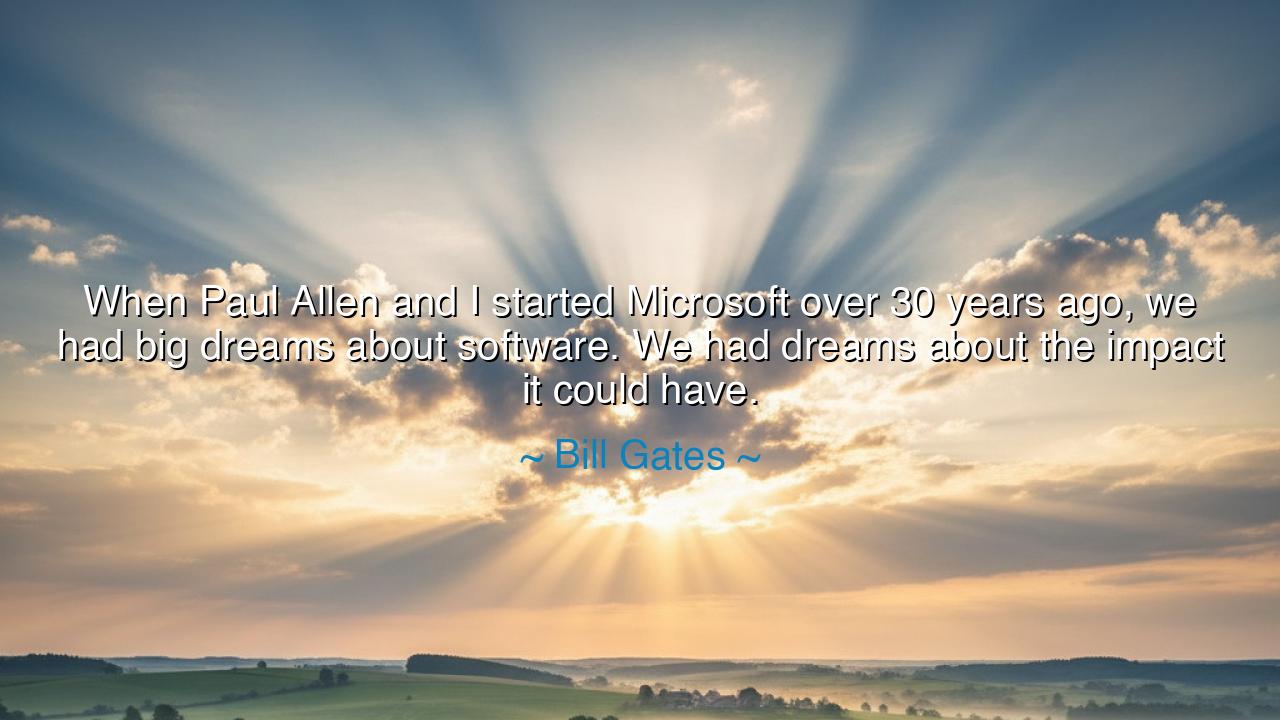
When Paul Allen and I started Microsoft over 30 years ago, we had
When Paul Allen and I started Microsoft over 30 years ago, we had big dreams about software. We had dreams about the impact it could have.






“When Paul Allen and I started Microsoft over 30 years ago, we had big dreams about software. We had dreams about the impact it could have.” — Bill Gates
In this statement, Bill Gates, one of the great architects of the modern age, speaks not merely of technology but of vision — of the divine spark that begins in the mind before it shapes the world. His words, though practical in tone, carry the rhythm of something eternal: the journey of dreamers who dare to see the invisible and build it into form. When he speaks of big dreams about software, he speaks also of faith — faith in creation, faith in possibility, faith in the unseen future. For in every great transformation of humankind, there were always a few who saw beyond the horizon while others saw only the sea.
The origin of this quote lies in the early days of the digital revolution. It was the mid-1970s, and the world was still lit by typewriters and paper, its machines vast and impersonal, the realm of corporations and universities. Into this world stepped two young men — Bill Gates and Paul Allen — not with wealth or power, but with dreams. They envisioned a time when computing would no longer belong to the few, but to the many — when the hum of the machine would be as familiar as the beating of one’s own heart. “A computer on every desk and in every home,” they said, when such a dream was madness to most. Yet, as all true dreamers do, they believed not in what was, but in what could be.
And so, in a small room filled with circuit boards and sleepless nights, they forged a new world. The tool of their creation was not hammer or steel, but software — a language of logic and imagination, capable of giving machines a soul. Gates speaks of the “impact it could have,” and indeed, that impact has echoed across every corner of human life. Through their vision, people who once stood divided by distance and class found new ways to connect. Knowledge, once locked in libraries, flowed freely through screens. A boy in a village, a girl in a city, could reach the same sea of information — the same chance to learn, to grow, to dream anew.
Yet, within this triumph lies a deeper lesson about the nature of dreams and impact. For Gates and Allen did not simply dream of personal success; they dreamed of change. Theirs was not a hunger for glory, but a calling — to use their gifts for the advancement of humanity. The ancients would have recognized this spirit, for it is the same fire that moved Da Vinci to draw his flying machines, and Galileo to lift his gaze to the heavens. True dreamers are not content with comfort; they seek to shape the age they live in, to leave behind a legacy that whispers to future generations: “We were here — and we made it better.”
But even as we celebrate their triumph, we must remember that big dreams require endurance. The road from vision to reality is never smooth. Gates and Allen faced skepticism, exhaustion, and countless failures. They worked through nights when the light of the screen was their only sun. Yet, what carried them forward was the union of belief and discipline — the sacred marriage of imagination and effort. For dreaming without labor is fantasy; but dreaming with work becomes creation. This is the eternal law of progress, as true for the farmer as for the philosopher, for the poet as for the programmer.
The story of Microsoft, then, is not merely the story of computers. It is the story of human potential — the infinite capacity of the mind to turn thought into matter, to mold the invisible into the tangible. Every age has its dreamers, and every dreamer stands at the edge of the impossible. When Gates says, “We had big dreams about the impact,” he reminds us that the worth of a dream lies not in its grandeur but in its purpose — in how it uplifts others, in how it leaves the world more connected, more enlightened, more free.
The lesson, my children of the digital dawn, is clear: dream greatly, but dream with intention. Let your visions be not for comfort, but for contribution. Let your labor not be for applause, but for impact. For the world belongs not to those who dream idly, but to those who put their minds and hearts into action. Whether you build bridges or write code, paint murals or teach children — let your dream, like that of Gates and Allen, serve something larger than yourself. For in service, every dream finds its immortality.
And so, remember these words as both blessing and challenge: dreams become the pillars of the future when anchored in purpose and effort. Dream as Gates did — not merely of what you can have, but of what you can build. For one day, generations yet unborn will live in the world shaped by your vision — and they, too, will look back and say, “They dreamed, and because they dreamed, we now live in their light.”






AAdministratorAdministrator
Welcome, honored guests. Please leave a comment, we will respond soon